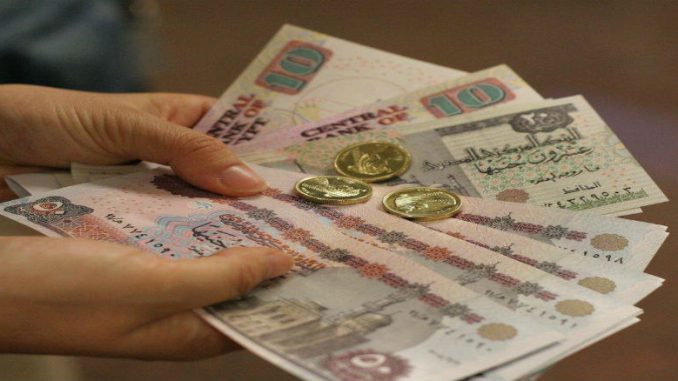
Egypt’s Petroleum Minister Tarek el-Molla says Egypt’s debts to foreign oil companies hit $3.6 billion.
Tarek el-Molla, the Egyptian Petroleum Minister, said that Egypt’s debts to foreign oil companies have reached $3.6 billion. El-Molla added that the numbers are unsteady and volatile according to the foreign partners’ bill each month.
He said that the Petroleum Ministry has agreed with Ministry of Finance and the central bank to schedule the accumulative arrears owed to foreign oil companies.
It is noteworthy that the Egyptian government has completed the purchasing of foreign oil companies’ shares of crude oil and natural gas in the 2015/2016 financial year, which is worth $5.4 billion.
Moreover, it has also paid $100 million accumulative arrears in 2015/2016.
In fact, Egypt’s external debt is currently estimated at $100 billion, including the $30 billion Dabaa project’s loan, as well as the debts due to governmental and economic institutions and foreign oil companies.
Hani Tawfik, the former chairman of the Egyptian Direct Investment Association, said that the current value of Egypt’s external debt represents the net loans obtained by the government excluding the Dabaa project’s loan.
He also predicted that the total external debt is likely to exceed $100 billion.
He added that this has resulted from the debts owed to international, public and economic institution, the $25 billion Dabaa project’s loan- along with an interest of $5 billion- as well as Siemens accruals and the oil companies’ arrears.
Egypt has been hit by the harshest economic crisis in its history. Since Abdel Fattah al-Sisi, who led a military coup in 2013 against Egypt’s first democratically elected President Mohamed Morsi, Egypt’s economy has dramatically deteriorated.
Al-Sisi was incapable of rescuing the Egyptian economy as he has previously promised.
Instead, Egypt has secured $12 billion loan facility from the International Monetary Fund whose executive board approved the agreement last November.
In this context, Egypt has taken dramatic economic reforms to meet the IMF requirements.
On August 30, Egypt started its first steps towards the loan when Egypt’s parliament approved a long-awaited law introducing a value-added tax (VAT) of 13 %, rising to 14% in the next fiscal year.
On November 3, the Central Bank of Egypt floated the Egyptian pound and gave up trying to peg the currency to the US dollar allowing it to devalue by almost half.
On November 4, Egypt took another unprecedented decision, which has always been abandoned by former leaders in fear of public unrest, to cut subsidies for fuel leading to a jump in prices.
In this context, there is no doubt that one of Egypt’s challenges is to withhold its supply of foreign currency to have an abundance to be used in business.
This mainly aims to diminish the black-market phenomenon in order to keep the prices controlled and to prevent the shortage of foreign currency that occurred before.
Hany Farahat, a Cairo-based senior economist at CI Capital said, “The disappearance of the black market will depend on banks’ ability to fulfill client demands on dollars, which should improve as rates become attractive and entice dollar-holders to dispose of their holdings.” He added, “I expect this to be gradual, likely to take months rather than weeks.”
Accordingly, Egypt is in need of every single dollar to maintain its foreign currency supply. Also, Egypt is in a really bad position after Aramco, the Saudi Arabian Oil Co., halted shipments of oil products to Egypt indefinitely.
In October, Saudi Aramco informed the Egyptian General Petroleum Corp. that it would suspend supplies of refined oil products. Aramco had agreed earlier this year to provide Egypt with 700,000 metric tons of refined products each month for five years in an arrangement valued at about $23 billion.
Egypt, which relies on imports to meet its energy needs, faces higher costs for gasoline and other oil products after the government decided on to allow its currency to trade freely as a step toward stabilizing an economy weakened by a dollar shortage.
London-based Ehsan Ul-Haq, an oil-market analyst at KBC Energy Economics, said, “This leaves Egypt in a very difficult position – the pound flotation means the government will have to pay much more for its imports, and now it has to go to the international markets to secure its gas, oil and diesel supplies on much more difficult payment terms.”
“I don’t think Egypt will be able to get similar conditions from any other countries in the region,” he added.
Tensions between Cairo and Riyadh have escalated as a result of Egypt’s divergent stances in sensitive issues to Riyadh. Egypt has voted in favor of a Russian-backed draft resolution in the UN Security Council on Syria, which was opposed by Saudi Arabia. Two days following the voting, Saudi state-owned oil company Aramco announced halting oil product supply to Egypt.



